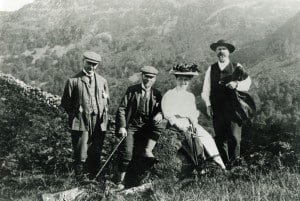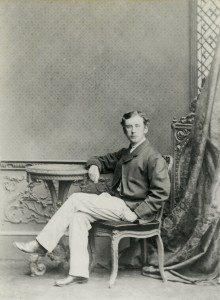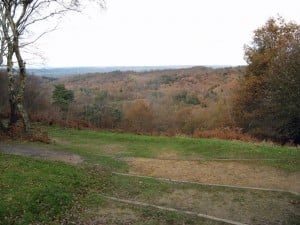Support us from £3/month
We deal with almost 1000 cases a year assisting communities, groups and individuals in protecting their local spaces and paths in all parts of England and Wales. Can you help us by joining as a member?
6 November 2013 is the centenary of the death of Robert Hunter, the society’s solicitor from 1868 to 1882.
Robert Hunter was an early luminary of the Commons Preservation Society (CPS), as the Open Spaces Society was first known. He later became solicitor to the General Post Office and founded the National Trust. He was knighted in 1894.
Born in Camberwell, south London, in 1844, Hunter excelled at school and enjoyed a happy upbringing. He graduated from University College London in 1865 with firsts in logic and moral philosophy. It is fortunate for the open-spaces movement that, after considering a career in the church, he opted to become a lawyer.

In the Lake District, c1900, l to r: Benny Horne (family friend and NT solicitor), Robert Hunter, his daughter Winifred and Canon Hardwick Rawnsley. Photo: National Trust Images
Competition
In 1866 he spotted a competition which appealed to him. Henry Peek, a leading commoner on Wimbledon Common (which was threatened with enclosure by Lord Spencer), was offering prizes for original essays on commons preservation. Hunter wrote about 25,000 words on ‘The preservation of commons in the neighbourhood of the metropolis’. He argued that the 1235 Statute of Merton (which allowed inclosure of commons provided that land was left for commoners) should be repealed and that the Metropolitan Act 1866, which protected spaces only in London, should be extended to ‘all open spaces within certain distances of large towns’.
Hunter didn’t win the competition but the judges (who included the CPS’s chairman George Shaw Lefevre, later Lord Eversley) recognised the work’s exceptional quality. This boosted Hunter’s confidence and he asked Philip Lawrence, solicitor to the CPS, if he could be taken into the partnership. In 1867 he was employed by Lawrence as a clerk and he successfully fought the Wimbledon Common case.
In 1868 Lawrence sold his business to Hunter and two senior partners. The firm Fawcett, Horne and Hunter was appointed solicitors to the CPS.
Legal battles
In that role, Hunter fought many legal battles, leading to the protection of Epping Forest, Hampstead Heath and Ashdown Forest, among many other commons. Hunter was a meticulous researcher and tireless worker for the cause. He soon became the country’s leading expert on the law of commons.
In 1882 he was appointed solicitor to the General Post Office by Henry Fawcett MP, who was Postmaster General in Gladstone’s second government. At about that time he moved to Haslemere, Surrey, with his wife Nellie and three daughters, Dorothy, Winifred and Margaret.
Here he continued his work for the society in a voluntary capacity, helping to set up a Haslemere branch in 1884 of which he was appointed chairman. In 1905 Hunter chaired a committee formed to buy at auction 750 acres of nearby common land, which included Hindhead Common and the Devil’s Punch Bowl. The committee paid £3,260 for the land which it later gave to the National Trust.
It was Hunter’s idea to establish the National Trust. In 1884, when he was a vice-president of the CPS, he gave a lecture to the National Association for the Promotion of Social Science. The paper was called ‘A suggestion for the better preservation of open spaces’ and he set out the many threats to commons and open spaces from enclosure and appropriation—threats which sound familiar today. He proposed a land-owning company to protect open spaces.
The following February, Octavia Hill (another leading member of the CPS) wrote to Hunter suggesting names for the company. At the head of this letter Hunter pencilled ‘?National Trust’. However, it was to be another ten years before the trust was founded jointly by Hunter, Octavia Hill and Canon Hardwicke Rawnsley.
It is sad that Hunter died of toxaemia only four months after he retired from the Post Office. His achievements were magnificent, but he does not get the immense credit he deserves for saving so many of our commons and open spaces.
Much of the above information comes from the excellent book, Sir Robert Hunter, by Ben Cowell, Pitkin Guides, £4.99.


